Fascinated by Gallo-Roman history? Click Here to download > > > Here are 6 ways Rome affected France
- Home ›
- Destinations ›
- Paris ›
- Avoiding Pickpockets in Paris
Pickpockets in Paris: How to Avoid Getting Robbed
Updated 16 January 2024 by Leyla Alyanak — Parisian by birth, Lyonnaise by adoption, historian by passion
Pickpockets in Paris are common. We know that, but we still, sometimes, get caught off guard. I've been robbed before, and so have several friends. Nothing serious, but enough to take precautions. Like these.
As you gaze up admiringly at the Eiffel Tower, you may not even feel those gentle fingers slip into your pocket or bag and wrap themselves around your money.
But next time you try to buy something, your own fingers may grasp only air as you search desperately for your missing funds.
You − and up to 100,000 other unsuspecting visitors − have fallen prey to pickpockets in the French capital, the bane of city authorities.
The good news, though, is that pickpocketing is probably the worst crime you'll witness on your trip.
How bad are pickpockets in Paris?
Anti-pickpocketing accessories
Most common pickpocketing scams in Paris
- The distraction
- The public transportation scam
- The personal touch
- The grab and run
- The confidence trickster
- The fake infirmity
- The physical encounter
Who are these Paris pickpockets, anyway?
Pickpockets: Paris places they hang out
NOTE: Pages on this site may contain affiliate links, which support this site. See full Privacy Policy here.
It isn't a nice feeling to be robbed.
It has happened to me before and it leaves an unpleasant taste. Admitting you've lost something (often items of value) is bad enough, but it's even worse when you feel you might have been able to avoid it.
Just remember this: YOU are not at fault. You are the victim, and the thief is to blame.
That said, there are things you can do to minimize the risk to yourself and the opportunities available to thieves.
HERE'S HOW I KEEP MY MONEY AND BELONGINGS SAFE IN PARIS
What I find really helpful is wearing a cross-body purse, also called an anti-theft purse. There are many brands but I prefer Pacsafe (I have three different models). I bought my first one after I was robbed - and never leave home without one.
These three bags are obviously different but share some common traits.
The main one? If you're a thief, try getting into them! The straps are lined with titanium, the material is slashproof, there are locking loops and tabs, and they're RFID safe so no one can steal your identity.
Not interested in carrying a bag (no matter how light)? Then try an infinity scarf with a hidden pocket. Your belongings will be hidden away, incredibly fashionably.
My goal here today is to help you enjoy Paris the way you should by making you more attentive and telling you which scams to watch out for, where pickpockets congregate, and what to do when sticky fingers begin rifling through your pockets or bags.
Yes, even in Paris.
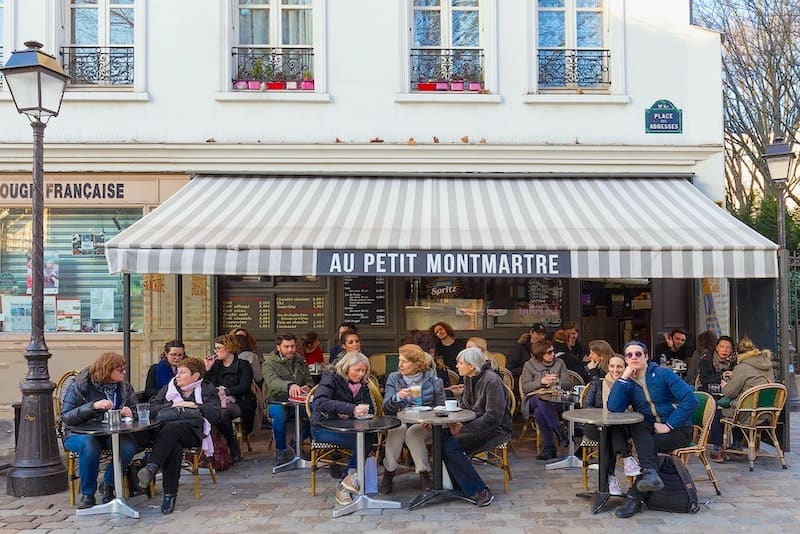 Enjoying an outdoor cafe in Montmartre: one should not have to worry about pickpockets in Paris!
Enjoying an outdoor cafe in Montmartre: one should not have to worry about pickpockets in Paris!How bad are pickpockets in Paris?
The Paris crime rate is relatively low for violent crime but does rise for petty crime and pickpocketing.
Even the government warns against pick pockets by putting up signs in frequented areas and broadcasting warnings in stations and airports.
First, whatever the level of petty crime in Paris, know that the vast majority of robberies are non-violent. Thieves want your stuff − they don't want to hurt you. All they want is to disappear into the crowds and seek out their next victim, not get caught and thrown into jail.
Second, much of this crime is opportunistic: it happens when thieves spot an opportunity, something almost too good to resist − a cellphone carelessly placed on a café table top, a wallet slipped into a back pocket, a purse on the back of a chair. Eliminate the opportunity and chances are you'll eliminate the crime.
Third, there is a portion of petty crime that is handled by organized gangs that prey on tourists and that may even work internationally, rotating thieves between countries when their faces become too known to French police. This, too, can be deterred, although with greater difficulty.
Whatever the face of petty crime rate in Paris, there is no question it is on the rise.
Police presence in Paris is beefed up during the tourist season but no matter how many police are deployed, there always seem to be more petty criminals than there are uniforms.
Bear in mind, though, that if you're visiting Paris in winter, pickpockets will be scarcer – but they will still be around.
Let's see how we can foil some of those grabby hands, shall we?
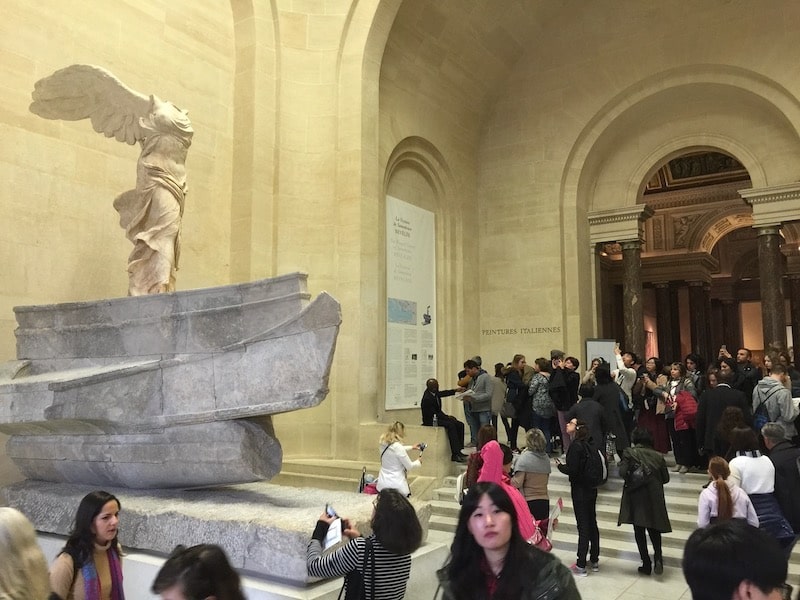 Crowds like this one at the Louvre attract pickpockets
Crowds like this one at the Louvre attract pickpocketsHow to avoid pickpockets in Paris: safety accessories
I've already mentioned a number of products and items you can use to protect yourself from pickpockets, but I'll list them again here for ease all in one place:
- A cable lock will allow you to fasten your bag or backpack to a table or radiator.
- A money belt to keep the bulk of your money and credit cards.
- A portable safe to leave your valuables in your room.
- A Pacsafe anti-theft bag to prevent a grab and run.
- Or if you'd rather, an anti-theft sling day pack.
- A neck wallet alternative to a money belt.
- A lanyard for your smartphone.
- An infinity scarf with a hidden pocket for your cards and bills.
Is Paris safe? Should you avoid Paris because of pickpockets?
Absolutely not!
Yes, Paris has its share of pickpockets but with a bit of caution, you can emerge unscathed from your visit. Victims of pickpockets are often robbed because of carelessness or lack or awareness or simple ignorance. Understanding these pickpocketing Paris tips will go a long way towards protecting you but in truth, there are no guarantees and no matter how well-informed you are, things can still happen.
Paris is one of the most extraordinary cities in the world, filled with major tourist sights and attractions. There's no reason to avoid it, despite the pickpockets.
Be careful, be aware, and then go out and enjoy the dream that is Paris.
Paris pickpocketing scams
Pickpocket techniques are extremely creative but even so, their approaches and scams tend to belong to certain categories: once you know these categories, avoiding pickpockets becomes a lot easier, as does adapting your solutions to pickpocket techniques.
These Paris scams may be the most common but they're not exclusive to the city and are equally popular in New York and London, or anywhere tourists flush with cash congregate.
Here's how these scams break down.
The distraction
Distraction is at the basis of many pickpocket events, and most of the scams itemized below will in some way involve distraction.
Usually this kind of approach will happen in a crowd, where something distracts you, like loud music or a shove. It can be quick and professional, and you can be pickpocketed and the thief long gone well before you have an inkling you've been robbed.
It can also happen while you're sitting at one of those impossibly romantic Parisian cafés: you've just snapped that viral Instagram shot, you put down your phone, and someone distracts you, with a petition or a newspaper or a question. By the time you realize what's happened, your phone is gone.
HOW TO PREVENT PICKPOCKETING
- Be aware of your surroundings, especially when there are crowds or around sensitive areas, like ATM machines. If you're using a machine, notice if someone approaches and do not talk to them.
- Keep your valuables out of sight.
- Don't leave your phone sitting where someone can run off with it, or at least use a tether or lanyard to fasten it so that theft becomes a lot more difficult.
The public transportation scam
Pickpockets love buses and subways: they're crowded and you expect people to be scrunched against you.
Thieves on public transportation are particularly skilled at making their escape just before the doors close, and once that happens, there's no catching them.
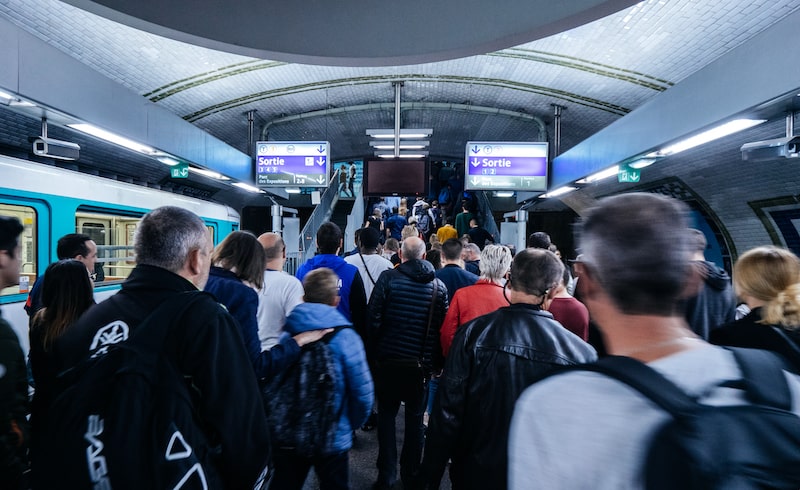 This kind of crowded Metro scene is perfect for pickpockets in Paris - and should make you careful about your belongings
This kind of crowded Metro scene is perfect for pickpockets in Paris - and should make you careful about your belongingsHOW TO PREVENT IT
- Be attentive when you get into the subway - it's often busy and a preferred moment for pickpocketers. Once inside, stay away from the doors, where pickpocketers like to grab and run just as the doors close.
- Inside the subway, be especially aware of anyone leaning against you.
- Don't keep any valuables in your pockets, where they can be easily reached.
- Keep your bag where you can see it (that includes backpacks).
- Keep your bag safely sealed. Models like the Pacsafe series have lockable zippers and are almost impossible to penetrate.
The personal touch
It's difficult to turn down someone who engagingly approaches you but there are many scams involving people who come up to you.
The"directions" are a classic: someone approaches you with a map and... asks for directions. You're obviously a tourist − how should you know where something is? Or they might ask for a light, or a translation...
The "ring scam" is so old one wonders how it continues to work, but it does. Someone bends down to pick up what looks like a gold ring and asks if it's yours. While you're being bamboozled, there's every chance an accomplice is searching for your wallet. If you say it isn't yours, they'll offer to sell it to you at a bargain price. While you're negotiating, that accomplice is busy robbing you.
The "wristband scam" is similar. Someone will approach you and before you know it, will have tied a string or macramé "friendship bracelet" around your wrist. They'll then demand payment − it's hard for you to deny having the bracelet: there it is, plain as day, right on your wrist. Most people will pay up just to avoid a scene.
Another classic is the "interview" or "NGO fundraiser" to help animals or refugees: the obvious approach will be someone, who often looks like a student, approaching you with a petition on a clipboard. Some of these may be legitimate, sadly, but you can't know which. The clipboard may be used to hide the theft, or the manoeuvre will be used to distract you while someone else picks your pocket.
HOW TO PREVENT IT
- Be particularly suspicious of anyone who approaches you in a touristed area.
- Avoid anyone holding up a map or looking like a lost tourist (let someone else guide them).
- Keep your wrists to yourself and be ready to pull back if someone grabs your arm or hand.
- Walk the other way if you see someone approaching you with a clipboard. If you do speak to them, keep your belongings firmly in sight.
The Grab and Run
This is altogether too common, and can be highly distressing but is common in Paris. Basically it involves someone grabbing your phone or snatching your purse and running off with it.
Remember that many pickpockets work in pairs or groups, so even if you think you might be able to catch a thief, s/he may well have an accomplice nearby to foil your attempts.
HOW TO PREVENT IT
- Be aware - don't sit with your earphones on, especially among crowds or on the Paris subway, especially at a Metro station; pay attention to people around you.
- Fasten your phone with a security strap.
- Use an anti-theft crossbody bag to prevent someone grabbing it off your shoulder.
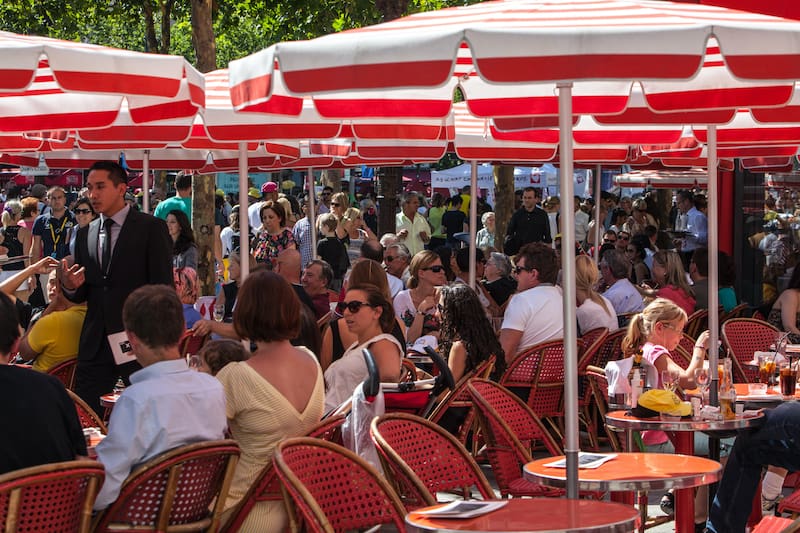 This is precisely the kind of place pickpockets scout - looking for phones on tables or purses carelessly slung across the back of chairs
This is precisely the kind of place pickpockets scout - looking for phones on tables or purses carelessly slung across the back of chairsThe confidence trickster
The creativity demonstrated by pickpockets in Paris is quite something.
An increasingly popular trick is dressing up as a tourist to gain your trust. Sometimes, they're indistinguishable from the real tourist, selfie stick and all! But if they get close to you, robbery could be their motive.
While many operate out in the open, others dress up as hotel guests and work − you guessed it − hotels. They could target your room while you are away sightseeing, or your belongings while you eat (leaving your bag on a chair while you head for the buffet may not be the wisest decision), especially during breakfast, when there is massive turnover and you'll be leaving your belongings unattended as you fill up at the buffet.
HOW TO PREVENT IT
- Keep your articles safe in your room by using a portable safe like this one (I have the same one).
- When carrying an item around, secure it to chair, table or other item by using a cable lock. A determined thief can still run off with your item, but it will take them time and call attention to what they're doing.
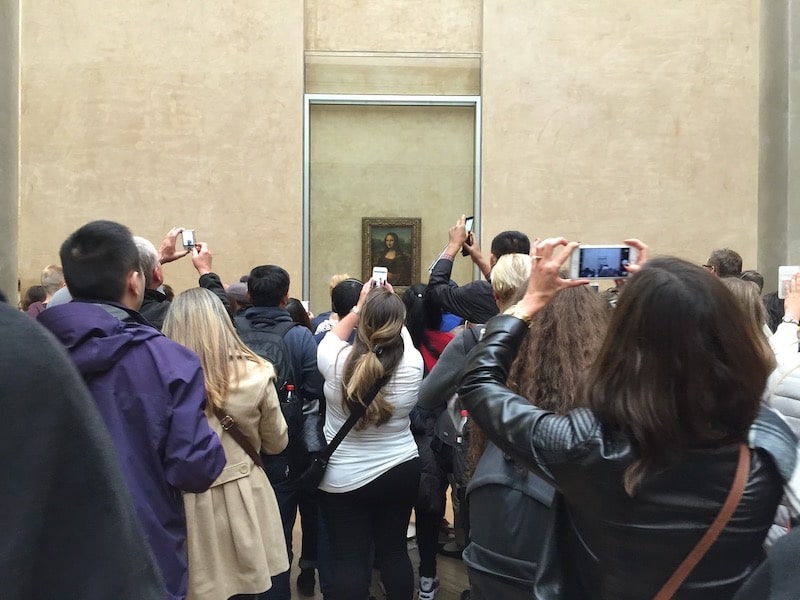 Imagine how easy it would be to "borrow" something from these visitors - they're totally focused on the Mona Lisa and might not notice a pickpocket
Imagine how easy it would be to "borrow" something from these visitors - they're totally focused on the Mona Lisa and might not notice a pickpocketThe fake infirmity
Sad to say but thieves use disability as a way to gain your pity or trust.
A blind woman may bump into and you'll be distracted for a moment, by her cane or by trying to help. In a little while, you may realize your wallet is gone...
Or a "deaf" man may approach you asking for money or a donation − but may not be deaf at all.
HOW TO PREVENT IT
- If approached by someone who appears handicapped, just say "No, thank you", and keep going.
The physical encounter
Several of the scams mentioned so far involve some sort of physical contact, such as grabbing your arm or jostling you.
Sometimes, though, contact can be even more direct.
Someone may spill something on you and "help" you clean up; while they're mopping up the offending drink or ice cream, an accomplice is surreptitiously making off with your money.
Or a jogger may "knock you down", apologize and try to help you up, discreetly helping himself to whatever is in your pocket.
Or a group of kids may be playing rambunctiously nearby, with a few friendly jostles and pushes, and next thing you know, money is being lifted.
HOW TO PREVENT IT
- Carry some tissues with you. If someone spills something on you, don't let them help you clean it up. Have the presence of mind to move away.
- Keep your eye out for groups of kids bumping into adults.
Who are these Paris pickpockets, anyway?
We may have an image of young men, agile and fleet, running relays and escaping the most watchful policeman.
But that would not necessarily be true.
In reality, many Paris pickpockets are female. Some are older, disguised as older women or mothers with babies (or dolls wrapped up to look like babies).
Or they may be gangs of female adolescents, some barely in their teens, some even younger, who work together picking pockets and passing the money among themselves so as not to be caught. One or two may distract you, while the others take your things.
Pickpockets: Paris places they hang out
The most popular pickpocket hangouts are without a doubt the most popular tourist places − or places you would expect tourists to visit.
Certain neighbourhoods are more "active" than others. For example, Montmartre, the Marais, the Latin Quarter or Pigalle are hugely popular with tourists, and therefore, with pickpockets.
The main tourist attractions, of course, are magnets for pickpockets − places like the Eiffel Tower (especially as you're waiting in line or where people are selling souvenirs), the Sacré-Coeur, Versailles, the Opéra, the Puces de Saint-Ouen and other flea markets...
Public transportation to and from these attractions are targets, as is the RER metro from Charles de Gaulle airport.
Museums are attractive for pickpockets, especially the extremely popular Louvre or Musée d'Orsay. While you're gazing admiringly at an Impressionist painting, someone may be gazing admiringly at your unprotected purse or wallet.
Another popular place for pickpockets are the wonderful department stores of Paris − Galeries Lafayette, Printemps, Samaritaine, Bon Marché − whether in crowded areas or at cash registers where money is being handed over and wallets placed on counters.
A final place to watch out for are American fast food outlets where tourists may gravitate because of their familiarity, places like McDonald's or Subway. The issue here isn't crowds but beware of other "friendly tourists" who might approach you.
Basic travel tips to keep pickpockets at bay
I've introduced you to a number of specific strategies (above) that can help prevent theft and keep away pickpockets. Let me recap these and add a few more general approaches that will help protect your belongings while you visit the wonderful city that is Paris.
- Become familiar with Euros before you step out of your hotel room. You don't want to be fumbling with coins and cash just when you need your concentration.
- Keep your wits about you. Your surroundings may be stunning but don't just gaze adoringly: be aware − this is the real world, not an amusement park. Think of a big city back home. What precautions would you take there?
- Notice the people around you, how they move and where they go. If anyone approaches you unexpectedly, you'll be prepared.
- Don't make yourself more of a target than you already are. Don't keep your expensive camera on the table or your purse dangling.
- Only carry with you what you are willing to lose: a small amount of cash, one credit card, and one piece of ID (consider taking along a photocopy of your passport rather than the original when you go sightseeing).
- Don't flash your funds and keep the bulk of your money hidden. A good way of doing this is by using one of the many excellent travel money belts on the market. Just keep the day's cash handy and if you need more, step into a bathroom to get more money out of your belt.
- Make sure the rest of your belongings are safe in some kind of anti-theft travel bag. Wear it cross-body and ensure it has a locking zipper. And avoid fanny packs, too easy to open.
- I know we try to dress like locals when we travel, but during the day, when you're sightseeing with a good guidebook in plain sight, hiding your tourist status may be difficult. I combine safety with style and wear my Scottevest, which looks like a plain (yet elegant) vest but is so filled with pockets I sometimes don't need any other accessories.
- Try not to look too rich. Leave the bling at home − it's like a beacon for pickpockets.
- If you're a man, do not keep your wallet in your back pocket. Pickpockets in Paris are experts and you will be shocked to find out they've managed to take your wallet without you knowing.
What if the worst happens?
If you notice you're getting robbed, yell loudly, "Police"! It's the same word in French as in English.
If you do get robbed, head straight for the nearest police station. You'll be able to file a complaint and get a receipt, which you might need for insurance.
You will also be able to provide a description that might help police track down the offenders (whom they often have to release because of their young age).
The city of Paris has also developed a guide to safety in Paris which you can read and download here.
Your Paris hotel: which neighborhood?
Pickpockets in Paris FAQ
How safe is Paris?
Paris as a city is relatively safe, with a low-ish level of violent crime. Certain neighborhoods, however, should be avoided, especially at night, so ask your hotel desk. Around tourist areas, I have always felt safe at night, even late and on my own.
Is pickpocketing common in Paris?
Yes it is, sadly, but pickpocketing in France is not as common as I've seen in other European cities, like Barcelona. Paris is immensely popular as a tourist destination and attracts millions each year. Pickpockets are attracted by crowds, where their chances of success are high.
Should I be concerned about pickpockets in Paris?
Not necessarily concerned, but definitely aware. Awareness is half the battle and by knowing about the danger of pickpockets, you can at least take measures to avoid them.
How do you deal with pickpockets in Paris?
The first thing to do is yell "Police"! They may not come, but it will at least alert others to the presence of a pickpocket. Get to a police station as quickly as possible and file a theft report.
Do locals get pickpocketed in Paris?
Yes they do, but probably not as often, because they are so aware of the problem. Unsuspecting tourists are far more attractive to pickpockets than wary Parisians.
Before you go...
We've talked at length about avoiding pickpockets, but concern visitors often have is about other kinds of danger in Paris. It's true there is violent crime in the city, but it is largely limited to certain specific parts of town and a few suburbs. It rarely spills over into the city center.
That said, better safe than sorry, so try to avoid these less safe areas in Paris, especially at night. There aren't many of them, but some parts of the city are simply unpleasant in the late evening – and there's no reason for you to visit.
Did you enjoy this article? I'd love if you shared it!
ESSENTIALS FOR FRANCE
WHAT'S THE BEST WAY TO GET AROUND FRANCE?
🚎 If you're in a city, use the excellent public transportation systems.
🚊 If you're going between cities or to smaller towns, you can usually take the train (I buy my tickets through RailEurope or Omio).
🚙 In rural areas, train stations are rarer so you might want to rent a car, which is easy in France (I use Discovercars).
DO I NEED TRAVEL INSURANCE FOR FRANCE?
It depends. If your travel insurance already covers you in France, then you're all set. If not, head for VisitorsCoverage for everything travel.
WHAT ABOUT IDENTITY THEFT AND ONLINE SECURITY?
That's easy! Just get a VPN, which cloaks your online presence (I use NordVPN everywhere).
WILL MY PHONE WORK IN FRANCE? WHAT ABOUT MY CHARGER?
You can use your roaming plan in France. If you don't have one, you can do one of several things (just make sure you have an unlocked phone).
📲 You can order a SIM card before you get to France.
🤳 You can buy a SIM card from a shop in France.
⚡️ You can buy an e-SIM.
WHAT SHOULD I PACK FOR FRANCE?
Here are a few essentials you should NOT leave home without:
👟 Comfortable walking shoes. You'll be on your feet a lot, and... cobblestones.
🔌 Plugs are different in France.
👜 An anti-theft purse (this is the bag I use).
🧣 An infinity scarf, for evenings when you don't want to carry a purse. In Paris and other major cities, there isn't much violent crime but there are plenty of pickpockets.
WHAT'S THE BEST WAY TO BOOK A PLACE TO STAY IN FRANCE?
✓ I use booking.com for my own travels around France. It lists both hotels and apartments, but mostly, it has generous cancellation policies.




